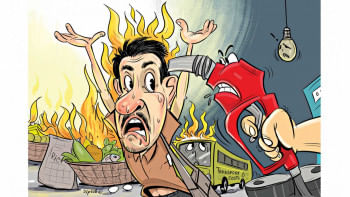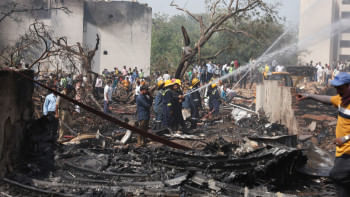Why are we failing to curb inflation?

That the world is grappling with rising inflationary pressure in the wake of the Russia-Ukraine war is not new information. This is the reference that is used every time the issue of domestic inflation is raised at discussions with policymakers. This is perhaps because it is easier to reflect on the problems than on solutions. The reality is that there are many other factors that are contributing to our inflationary woes – factors that we could have managed better.
For instance, the price of liquefied natural gas (LNG) has dropped in the international market. According to a recent CNN Business report, wholesale European gas prices dropped almost 48 percent since mid-December to trade at 71 euros per megawatt-hour in early January – roughly where they stood on February 15 last year. In the US, according to the report, the cost of wholesale gas flowing through the Henry Hub pipeline dropped 50 percent to $3.68 per million British thermal units (Mbtu) since late November, back to around levels last seen in December 2021.
Bangladeshi consumers, however, did not get the benefits of this global fall in energy prices.
While Bangladesh recently bought an LNG shipment from the spot market after an eight-month pause for delivery, the cost of energy in the country remains high. In fact, at the retail level, the electricity price was increased again last month – the third such hike since the beginning of the year. With general inflation rising to 8.78 percent in February this year, up from 8.57 percent in January, and February witnessing food inflation at 8.13 percent and non-food inflation standing at 9.82 percent, adding extra pressure on people would only take away from their already significantly compromised purchasing capacity. Although it is understandable that the government is now under added pressure to reduce energy subsidy – with the International Monetary Fund (IMF) making it one of the critical loan-sanctioning considerations – there are other, more urgent steps it should take, such as phase out capacity charges to private firms, rather than push the burden onto consumers alone.
The second factor is the taxation structure that is currently more favourable towards the rich and punishing for the groups with limited income. Think tanks have advised the government to design the taxation structure for FY 2023-24 in a way that is more equitable for all. The Centre for Policy Dialogue (CPD) suggested that the tax-free income limit of individual taxpayers be increased to Tk 350,000 from the current Tk 300,000, and in the second slab, the amount of taxable income be increased to Tk 300,000 from the existing Tk 100,000, so that the middle income groups get some respite from the burden of taxation and inflation. It has also been recommended that the highest tax rate be reinstated to the previous 30 percent from the slashed 25 percent to ensure tax justice, or else, while the rich get away by paying less income tax, the limited income groups will be at the receiving end of a greater tax burden.
With Ramadan coming up, people's woes will increase. Many are already forced to give up on basic necessities as they are unable to make ends meet. We cannot allow our people to live undernourished because there is a war going on thousands of miles away.
Keeping the taka's value artificially high has contributed to the inflation further. While the US dollar kept gaining strength since the beginning of 2022, it was only in April that the central bank decided to act on the situation and devalued the taka, with small corrections through to August, which enabled the banks to trade dollars at a much inflated rate. In the process, the dollar price rose to Tk 113-114 in the formal market and to Tk 120 in the kerb market. This mismatch led to the sliding of the taka by about 25 percent. Businesses that had previously borrowed in dollars from local and foreign banks are now having to pay extra to pay back. Importers are also having to pay extra to settle import bills. This situation is taking a toll on our foreign exchange reserves. It should be noted that Bangladesh's forex reserves dropped to a six-year low of $31.15 billion, post the central bank settling import bills of $1.05 billion with the Asian Clearing Union on March 6 this year.
Rocky remittance inflow and slower growth in export also contributed to the unfavourable forex situation, making it difficult for businesses to open import line of credit (LC), leading to supply-related risks for goods.
There is another risk: the government is borrowing heavily from the Bangladesh Bank – between July 1, 2022 and March 2, 2023, the government has borrowed Tk 50,043 crore, according to the central bank data. Given the liquidity crunch in the commercial banks caused by the lack of corporate governance, high related-party lending, and subsequent high non-performing loan (NPL) burden – defaulted loans increased by Tk 17,383 crore in 2022, with 88 percent of them turning into bad debt – these banks are themselves having to borrow from the central bank.
Foreign aid commitment and disbursement for development projects are also on the decline – in the first seven months of the current fiscal year, commitments fell by around 62 percent year on year, according to the Economic Relations Division (ERD) – and revenue mobilisation remains low. Under these circumstances, if the government keeps borrowing from the central bank, it will by default create additional pressure on the inflationary situation.
The government should, in this situation, seriously consider the advice of the think tanks on the overall macroeconomic management approach. While our policymakers have their own agenda to address in view of the upcoming general elections – easing the inflationary pressure should be one of them – they are not always best-equipped to handle delicate situations. That is why they should sit with the subject matter experts, take their opinions with an open mind, and work on them to pull the economy out of this mess that to some extent has been created as a result of incompetent governance.
With Ramadan coming up, people's woes will increase. Many are already forced to give up on basic necessities as they are unable to make ends meet. We cannot allow our people to live undernourished because there is a war going on thousands of miles away. Every challenge creates an opportunity, and we must capitalise on what is available to us to support our people.
Tasneem Tayeb is a columnist for The Daily Star. Her Twitter handle is @tasneem_tayeb

 For all latest news, follow The Daily Star's Google News channel.
For all latest news, follow The Daily Star's Google News channel. 










Comments